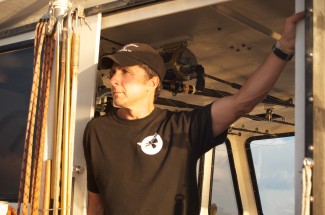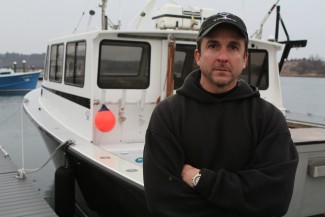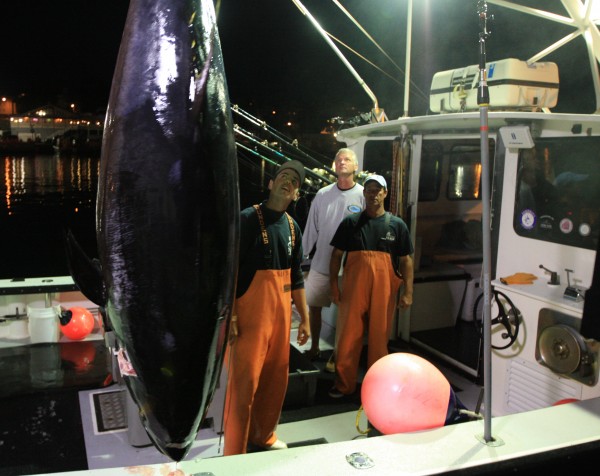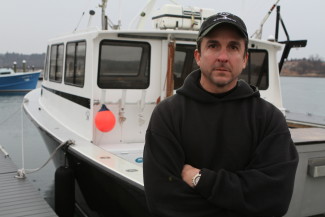INTERVIEW: Dave Carraro, star of ‘Wicked Tuna,’ on the monsters of the sea

The open ocean is an alluring prospect for hopeful fishermen. The horizon promises some positives (money, camaraderie) and more than a few negatives (a life away from family, difficult seas). No matter the consequences, commercial fishermen still shove off from docks around the world, willing to compete against their maritime colleagues for a slice of the ever-profitable fish pie.
Dave Carraro, star of National Geographic’s Wicked Tuna and captain of the Tuna.com boat, said recently during a phone interview that he heads out from his home in Gloucester, Mass., because the passion for catching monster bluefin tuna has never subsided. The money is attractive, but it’s the enthusiasm for the next great catch that gets his adrenaline pumping.
He’s now considered one of the most recognizable and successful tuna fishermen in the Northeast. And it all started in New Jersey, with a lonesome fishing pole and the support of a father.
“I started fishing as a little kid,” Carraro said roughly three weeks after the tuna fishing season ended. “Like most fishermen, I started fishing at my local pond with my father.”
He eventually starting “working hard” so he could have some disposable income to pay his way on the party boats that so attracted his interest. “Before I know it, eventually I started working on one of the boats that I was fishing on,” he said. “I really, really got into it. I was fishing every weekend in the winter. During the week, I was at school. And come the summer, I started working you know seven days a week on the boat.”
From party boats, it was a logical jump over to sports fishing. Back in New Jersey, he ran a successful outfit for a number of years, providing fish to a local restaurant. But still, it wasn’t enough. He needed to keep company with the best of the best. “I just really wanted to get more into the giant tuna fishing,” he said. “We weren’t catching many there in New Jersey, and eventually I moved up to Gloucester, Mass., and I’ve been up here now for, I’m going into my 14th season up here. So I’ve been in commercial fishing for about 20 years.”

The success that Carraro has found in Gloucester is impressive. He marks 2011 as his best year ever. He characterized 2012 as “pretty good also, and this year you’ll soon see.”
The fisherman and his crew still haven’t figured out why some seasons are fruitful, while others are more difficult for the industry. His best guess: “It’s a big ocean. They don’t have to come here, and there could be a lot of fish here, and we just have an off year. We’re just not on our A game. So there’s a lot of variables involved. We have years where there’s not a lot of fish here, nobody catches anything, and we do very well. It’s hit and miss.”
Wicked Tuna started to take shape a couple of years ago. The producers sent him a camera in the mail, and he needed to film the answers to some questions they had. At that point, the reality show was just an idea. “They got that camera back from us, and several other boats, and they liked what they saw,” he said. “And they moved to the next step, which was to come out to Gloucester and film those boats with the camera crews and the actual producer, just to put the cameras on us to see how we’d respond and to see if we were likable characters.”
National Geographic liked the show, put in the highest bid and it has been TV success ever since. Season two of the tuna series recently premiered; new episodes continue Sundays at 9 p.m.
Even though the tuna fishing community is large, Carraro knows many of the other captains. “The tuna fishing community, it spans basically from northern Maine all the way down to the Carolinas,” he said. “There are quite a few boats, but we may not bump into one another, we may not see one another, but pretty much everybody knows who everybody is. But specifically the boats that are in Wicked Tuna, I know them and I know them very well.”
A distinction should be made. These members of the fishing community are not exactly friends; they’re competitors, through and through. “If you are not competitive in bluefin tuna fishing, you will fail,” Carraro said bluntly. “We feed off one another. If a boat next to me catches one fish, I want to catch two. If he catches an 800-pound fish, I want to catch a 900-pound fish. … It prevents you from being lazy, and it just keeps you working harder and harder, you know, every day you’re out there. It’s perseverance.”

Identifying Carraro’s largest haul is a tough proposition. Tuna fishermen don’t always weigh the fish, and they usually strip it of guts and cut off the head. But one can offer estimates, and who doesn’t love a good story about a quality catch?
“When you find a fish, you don’t know if it’s a 1,000-pounder or a 500-pounder,” he said. “I mean I can catch a 1,000-pounder in 5 minutes, and I have. In comparison, I’ve had a fish that was 450 pounds but took us 12 hours to catch. So you really can’t tell until you get it up there.”
For the record, Carraro said his largest one was a little less than 1,200 pounds. “When we got it up to the boat, and harpooned it, and went to put the tail rope around it … the skin from tip to tip was so wide, it was almost impossible to get the tail rope around it,” he said. “But once we did get the tail rope around it, we saw how thick that tail was. It was just like a tree trunk. It was just ginormous.”
The tuna was so large it got stuck in the fish door. “We basically had to cut off part of the fish, the sides of it, to get it in the door,” he said of the catch from about six years ago. “We actually somewhat ruined the fish just a little bit.”
The final measurement: 128 inches long, or little less than 11 feet.
A big fish like that means a lot of money, but Carraro stressed his passion for the industry. “I always say with this business, it’s passion first, dollars second,” he said. “Do I make a lot of money doing it? Yes, I do. However, if you take the amount of hours you work out there by your total gross income … you’re basically working for minimum wage. There’s a lot of hours out there.”
The seed was first planted when Carraro was 13 or 14 years old. “I remember the first time I caught my first giant bluefin tuna,” he said. “That fish was just over 1,000 pounds. At first hookup, when I saw that rod bend over, that feeling was just absolutely incredible. Now, the last fish I caught, just a few weeks ago, that same feeling I experienced when I was 13 years old existed three weeks ago. Every time you catch a fish, that same excitement is there. So it never gets old.”
What does season two of Wicked Tuna promise? Carraro said the inaugural season saw the boats pull in 24 fish. This upcoming season has 55 catches. To pull in that much tuna takes times and dedication, and that means leaving loved ones behind on land for many days at a time.
“I’m a single guy, and there’s a reason for it,” he said. “When we go out on the show, it appears for many viewers that we’re just out for the day. What you don’t really see is that we’re gone for three, four, five days at a time. And when we come in and offload, and sell our fish, basically we put fuel in the boat, we put ice on the boat, we get our provisions and we go right back out.”
Here’s how Carraro summarizes his year: “The season officially opens June 1, and it closes Dec. 31. However, we really only fish hardcore from August through the end of November. So from August all the way through November, I’m gone all the time. And when I am home, like on a weather day or something when we can’t fish, you’re not done fishing. There’s a lot of maintenance to be done on the boat, from things that are broken, just to keep the boat in the shipshape. So even on your days off, you’re not off. As a matter of fact, when you’re off and you’re at the dock, you’re probably working harder than you are out there. So yeah it’s tough. … And then even when I’m done fishing, I’m a captain for JetBlu Airways.”
Will he ever hang up the rods and become a landlubber?
Not a chance.
“I’ve been fishing since I was a little kid, pretty much just from the time I could start walking,” Carraro said. “I’ve been doing it this long, and you know that passion is still there. I don’t see myself stopping. The only thing that’s going to stop me from fishing is my health.”
By John Soltes / Publisher / John@HollywoodSoapbox.com
-
Click here for more information.


20 thoughts on “INTERVIEW: Dave Carraro, star of ‘Wicked Tuna,’ on the monsters of the sea”